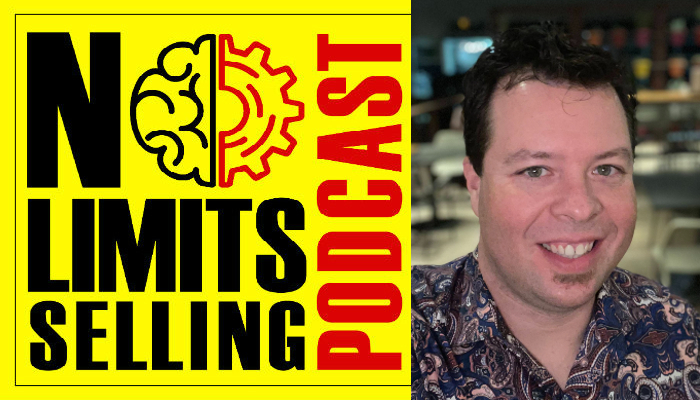How To Stop Being Weird And Start Selling by Sam Wakefield
On Episode 150 of The No Limits Selling Podcast, we have Sam Wakefield, Solar Advisor at Apricot Solar.
Have you ever truly felt the heat of customer rejection? Have you ever wanted the sales process to be cool and relaxed each time?
Sam Wakefield has always believed in learning from the ground up and that was no different when he entered the world of HVAC. Starting on install crews and working in tight spaces, Sam knew he wanted to advance up the chain and so the next obvious step was sales but that came with fear, doubt, and anxiety of rejection. Not one to be stopped he followed the advice of the great Jim Rohn that said “For things to be better, you have to get better. For things to change, you have to change”.
Diving deep into his growth and being willing to stand in the “HEAT” of self-development, Sam took control of the thermostat of sales. Breaking down the process, he was able to understand why customers get heated over sales pitches and give no’s to receiving cooler yeses with a 50+% closing rate. With his proven “Close It Now” sales system and Podcast working for him, Sam has not only sold millions of dollars in equipment he has gone on to win multiple sales awards while also becoming the lead sales trainer for companies in both small and large markets.
If you truly want to raise the temperature of your results, contact Sam now and book a coaching session with him for yourself and your team.

Contact Sam:
[EDITOR’S NOTE: This podcast is sponsored by No Limits Selling. It is a fun, fast-paced podcast that delivers hard-fought business advice that you can implement today to improve your sales and performance]
Interested In Our Real Estate Coaching Services? Explore Our Website: Link
Feeling Not Well Today? You Can Use Our Mindset Boosters App To amp Up Your Mood: Link
Find us on Social Media:
LinkedIn | Facebook community | Instagram
Like what do you listen to? Subscribe to our podcast!
Ready to become fearless? We can help you become fearless in 60 days so you accomplish more in your career Schedule A 15 min Call with Umar
Summary
Introduction and Background
The podcast begins with an introduction of Sam Wakefield, who is a Solar Advisor at Apricot Solar. Sam shares his background and how he came to be involved in the solar industry. He explains that his interest in renewable energy and sustainability led him to join Apricot Solar, a company that provides solar energy solutions to homeowners.
Understanding Solar Energy
In the next section, Sam delves into the basics of solar energy. He explains how solar panels work and how they can be installed in homes to generate electricity. He also discusses the benefits of solar energy, such as reducing carbon footprint and saving on electricity bills. Sam emphasizes that solar energy is not only good for the environment but also a wise financial investment.
The Role of a Solar Advisor
Sam then talks about his role as a Solar Advisor. He explains that his job involves educating homeowners about solar energy and helping them decide if solar is a good fit for their homes. He also assists customers in navigating the process of installing solar panels, from the initial consultation to the final installation.
Challenges and Misconceptions about Solar Energy
Sam discusses some of the challenges and misconceptions about solar energy. He mentions that many people believe solar panels are too expensive or that they won't live in their homes long enough to see the benefits. However, Sam clarifies that the cost of solar panels has decreased significantly over the years, and most homeowners start seeing savings on their electricity bills immediately after installation.
The Future of Solar Energy
In the final section of the podcast, Sam shares his thoughts on the future of solar energy. He believes that as technology advances and the cost of solar panels continues to decrease, more and more homeowners will switch to solar energy. He also hopes that government policies will continue to support the growth of the solar industry.
Conclusion
In this enlightening podcast, Sam Wakefield, a Solar Advisor at Apricot Solar, shares his insights on the solar industry, the benefits of solar energy, and his role in advising homeowners. He dispels common misconceptions, such as the perceived high cost of solar panels and the time it takes to see benefits, explaining that the cost has significantly decreased over the years and that savings on electricity bills can be immediate.
Sam also discusses the future of solar energy, expressing optimism about technological advancements and supportive government policies that will likely lead to more homeowners adopting solar energy. He concludes by emphasizing the environmental and financial advantages of solar energy, encouraging listeners to consider this sustainable and cost-effective option for their homes.
Questions & Answers
Who is Sam Wakefield and what does he do at Apricot Solar?
What are the benefits of solar energy as explained by Sam Wakefield?
What does a Solar Advisor do?
What are some common misconceptions about solar energy?
What does Sam Wakefield think about the future of solar energy?
Why should homeowners consider solar energy for their homes?
Don’t miss this opportunity to transform your real estate career with one-on-one coaching. As an experienced real estate coach, I, Umar Hameed, am dedicated to helping you unlock your full potential and achieve your real estate goals. To learn more about who am I and my clients ↓
If you’re ready to take the next step, book an appointment with me today and begin your journey toward success in the real estate industry.
